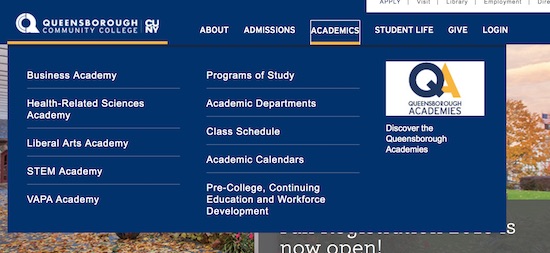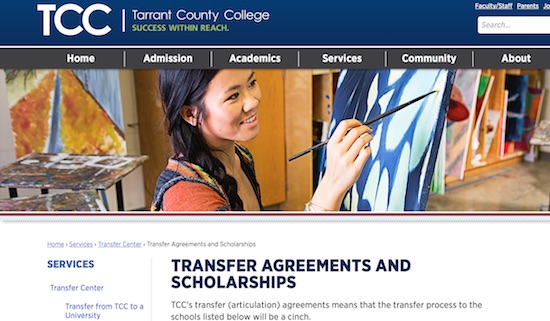
This post is about getting what you can out of your local community college. If you haven’t already read Part 1, then you should do so here.
Above we see a list if things you can study at this particular community college. What you will study is based upon the honest self-assessment you did, with the help of various disinterested professionals, your parents, and the school’s guidance counselor.
One thing that is notable is the “VAPA Academy.” A visit to the linked page tells me that this is “Visual and Performing Arts.” If you have a specific talent in this area, then Julliard, Columbia and U.S.C. would already be making you offers. For the rest of us, who need a job, enrolling in this program would be a waste of time. Your goal is to be self-sufficient, and that means a focus on some subject that you (hopefully) find tolerable, and which you can market to employers in return for a livable wage.
 If you have below-average scores on standardized tests, or if you just hate the idea of being in school, then you’re at the right place. Picking a trade program can get you into the workforce in as little as nine months.
If you have below-average scores on standardized tests, or if you just hate the idea of being in school, then you’re at the right place. Picking a trade program can get you into the workforce in as little as nine months.
Welding and Fabrication Technology is a degree which will likely lead to a good career, and an AAS degree in that field will take less than two years.
If you have decent or above-average scores, then you should also consider a technical degree. You can get your Master of Arts in Theoretical Physics after you’re established, at the same time Jethro is getting his MFA in Interpretive Dance. There are tons of interesting things to learn, which aren’t particularly marketable, and we all have things we’d love to know about. Our first duty, as men, is making a living.
If you think you want a 4-year degree (called a Bachelor’s Degree) then you want to study at the Liberal Arts Academy, or the STEM academy. Don’t be too concerned about what you want to concentrate on at university. Your present goal is to get the general prerequisites, that every student needs. With any luck, you’ll have a bunch of cheap hours that will transfer to the big university with you, and it’s there you can concentrate on something specific.
As far as transfer, there are legal agreements between most community colleges and larger schools nearby. Check these agreements out with the help of your guidance counselor and parents.

One of the many benefits of matriculation at community college is the lack of distraction. When you go to college, your goal is not to party, fuck random girls, play drinking games, or smoke dope. All of those indulgences will arise naturally, after you are independent, and making a good wage. Your only aim is getting to the point where you can afford to have a decent life. Most community colleges are full of serious, focused young brothers. The big universities, in contrast, have fraternities and nightclubs which compete for your attention.
When you go to community college, you should prepare to study through the summers. This will get you out of the system more rapidly, and given the impossibility of finding a decent summer job without a degree, there’s no reason not to do so. Full disclosure: Boxer taught at a community college earlier in his career. The summer courses at my school were abbreviated, had a much better teacher-to-student ratio, and were actually discounted to encourage kids to sign up. On the down side, fewer instructors meant a narrower variety of classes, which leads me to my next paragraph.
Once you enroll in a specific program, you will be faced with a list of requirements for completion. It is important to remember that once you are accepted to the program, the requirements will not change. In academic-speak, this is called a “catalog year.” If you agree to enroll in a specific program, and the school tries to change the requirements on you, then you can call the attorney general’s office. I have heard of this happening, but it’s not very common, and usually it’s the result of some moron in administration who makes a mistake with your records.

This is the 2018 catalog for an incoming freshman who is seeking a pre-engineering degree at a Florida community college. Once you matriculate, you want to stick to the program, down to the letter. Your goal is to take all the classes you need, to do as well as possible in every one, and never to take any course that’s not required.
In my experience, it is very common for schools to tier their registration dates. This allows more developed students to register for classes before new arrivals, and it may mean that the class you want is full, by the time you are able to request this. What many students don’t know is that professors generally have the ability to waive you into the course. I always did this when I knew the student was a solid guy, by previous experience. I also always did this when the student was referred by another colleague in the faculty. I never did this for burnouts, slackers, or time-wasters. It is imperative that you cultivate good relationships with your professors, in order that you can get such favors when you need them. You don’t need to be an ass kisser. You simply need to show up on time, be respectful, and hand in high quality work.
The degree above is called an “Associate of Sciences.” There is also an “Associate of Arts” degree, on offer, which is identical, except for an added requirement to take a full year of a foreign language. I highly recommend that you take a foreign language at community college. If you decide to do this, there are finer points to consider.

Armenian is probably an interesting language, and it will satisfy the liberal arts requirement of your degree. But how useful will it be to a potential employer?
If you make the (wise) decision to complete your language requirement at community college, you should study a language that customers and co-workers are likely to speak. In North America, there are two such languages. One of these is Spanish. The other one is French.
If you have a burning desire to learn Armenian, or Ancient Greek, or Coast Salish, then you can return to community college, after you’re established in a job, and study them in your free time.
A selling point of junior college is its affordability. While school will probably not cost much, it will cost something. How should a man pay for his time in the academy?

At every school, there are people who are begging to give you their money. All you have to do is take it. Do not feel badly about applying for scholarships. Guys like me donate to scholarship funds, and we do it so that you can get an easy ride. I had an easy ride myself, so every month when I kick them my pittance, I’m just paying it back.
If you have a lackluster history in high school, and you don’t get funding, don’t be discouraged. Get the Pell Grant, and be motivated to do as well as possible during your freshman year. An application before your second year of school, showing a dramatic improvement in your GPA, will open up new opportunities.
The next article in this series describes navigating the transfer process, employment, and thriving at the big four year university you might decide to attend. Read that here.
VAPA Academy? Hah! Vag And Penis Association Academy, they mean! I still get Omega rage over that ‘virginity by college major’ chart, where mathematicians were at 83% and ‘visual arts’ were at fricking zero.
https://www.buzzfeed.com/sarahmorgan/virginity-rates-by-college-major-d8
Performing arts studies is a financially good deal for horny men. Buying a semester in the ‘VAPA academy’ is like renting a room in a burlesque parlor… with benefits! Like free condoms and STD screening from Student Health.